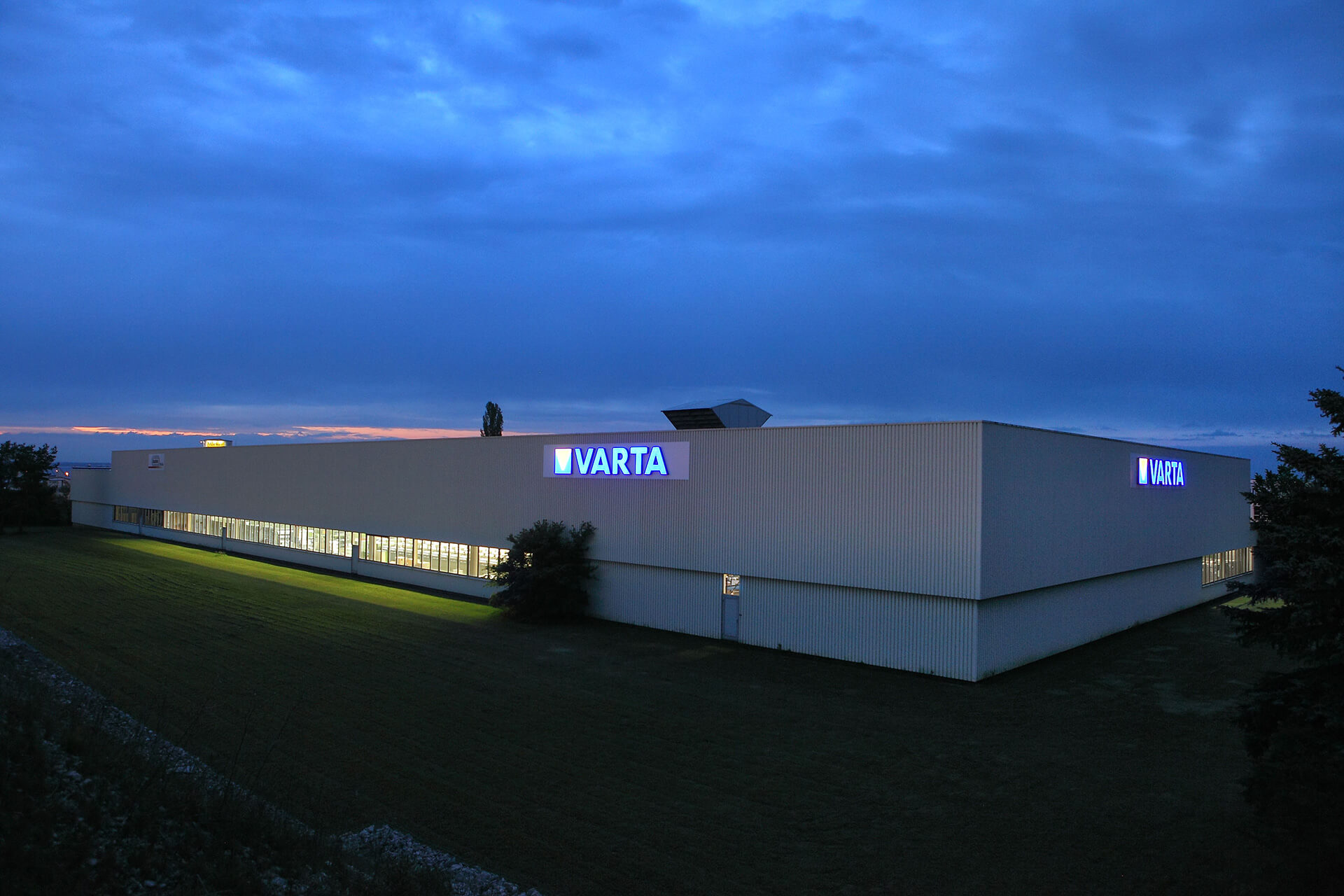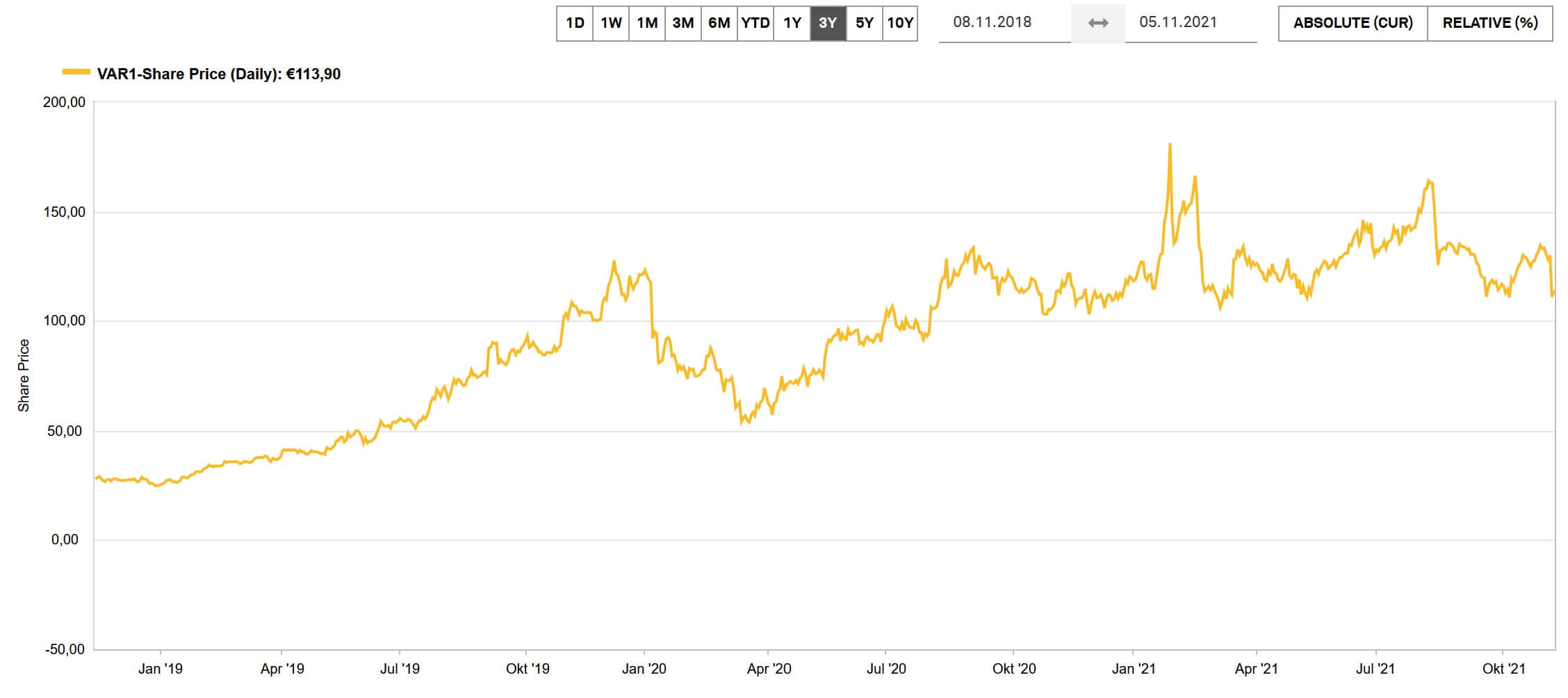
Varta - German technology from Ellwangen since 1887
"We are defining the future of battery technology to enable more independent living"
VARTA (acronym for: Distribution, Recharging, Repair of Transportable Batteries) is a long-established German battery group based in Ellwangen, Baden-Württemberg. VARTA AG, as the parent company of the Group, is active in the Microbatteries and Energy Storage Solutions business segments through its main operating subsidiaries VARTA Microbattery GmbH and VARTA Storage GmbH.
The Swiss industrial group Montana Tech Components is a major shareholder in VARTA with 57.9% of the shares. In addition to an approx. 5% stake held by Goldman Sachs, the remaining 37% of the shares are in free float. As one of the world's two largest manufacturers of microbatteries for hearing aids, VARTA Microbattery GmbH is a pioneer in the microbattery sector. The microbatteries for hearing aids are marketed under the brand 'power one' and as white label products for leading hearing aid manufacturers and battery brands. In addition, VARTA Microbattery GmbH is striving to expand its expertise in the field of microbatteries for hearing aids to the growth market for rechargeable microbatteries for consumer electronics and a consumer electronics and a wide range of industrial applications.

Through its subsidiary VARTA Storage GmbH the Group focuses on the design, system integration and assembly of stationary lithium-ion energy storage systems for households and households and customized battery storage systems for OEM customers. With four production and manufacturing facilities in Europe and Asia, as well as distribution centers in Asia, Europe and the U.S., the Group's operating subsidiaries are currently active in over 75 countries worldwide.
VARTA is also the brand name for goods manufactured or distributed by companies currently or formerly belonging to the Group. These include, for example, accumulators and batteries. VARTA AG consists of the three subsidiaries Varta Microbattery, VARTA Consumer Batteries GmbH & Co. KGaA and VARTA Storage GmbH. The brand name is also used in the VARTA Hotel and Restaurant Guide, which is published annually.
On board with over 70% of all manufacturers
Choice of original equipment manufacturers
Automobile manufacturers choose the components that represent the best solution. In addition to quality, there are two other aspects that car manufacturers look at when selecting a battery. One is performance, the other is a very low failure rate.
Leading battery supplier for automotive industry
The fact is that 7 out of 10 new vehicles with start-stop technology that are equipped with an AGM battery, have a VARTA battery. Via the OE logo ("original spare part") clearly documents that the component is an original part. This means that almost all VARTA batteries are produced on the same production line as the original batteries.
VARTA is well represented among new vehicles with start-stop technology
OE quality certificate and processes
VARTA has defined over 100 processes, product parameters and variables which are checked and monitored during the entire production of different batteries. Thanks to these high quality standards, the company is also a strong partner for the automotive industry. A clear competitive advantage here is the relatively high market entry barriers.
The global market for e-mobility
Electric cars will become more affordable in the future - experts forecast that the price of lithium-ion batteries will fall to around EUR 80 per kilowatt hour by 2025. In 2010, the price of energy storage units was still around EUR 600 per kilowatt hour.
Forecast for the price of energy storage per storable kilowatt-hour from 2010 to 2025.
The battery unit is considered to be the main reason for the increased price of electric cars compared to cars with combustion engines and thus indirectly for the reluctance of customers - especially in Germany - to purchase electric cars. TThe battery plays a central role in the production of electric cars as an energy storage device for the vehicle, because the range of the vehicle depends decisively on the battery capacity. Considering the main accumulations of manufacturers worldwide, still until 2022 the largest battery capacities will be produced in Asian countries, first and foremost in China. The producers with the largest market shares are Panasonic, CATL and BYD. However, through the construction of various gigafactories, crucial capacities will also be built in Western nations over the next years. VARTA is one of the upcoming players in the battery market in Central Europe.
The key financial figures at a glance
| Varta AG in EUR thousand | 2019 | 2020 | 2021e | 2022e |
|---|---|---|---|---|
| Sales / total output | 367.005 | 874.563 | 936.729 | 1.094.500 |
| Gross profit | 238.527 | 540.137 | 540.137 | 633.450 |
| EBITDA | 91.391 | 233.080 | 283.233 | 349.857 |
| EBITDA margin in % | 24,9 | 26,7 | 28,4 | 30,2 |
| EBIT | 76.558 | 181.217 | 185.000 | 238.414 |
| EBIT margin in % | 20,9 | 20,7 | 20,4 | 21,8 |
| Group result | 50.390 | 95.411 | 128.650 | 166.500 |
| Adjusted earnings per share (EPS) in EUR | 1,28 | 2,36 | 3,28 | 4,02 |
VARTA AG aims to increase its total output from EUR 275.8 million to EUR 1,094.5 million from 2018 to 2022. This corresponds to an average sales growth (CAGR) of 41% per annum. The company operates with a gross profit margin of over 60%. In 2020, due to corona, there was a standstill in the margin improvement of EBIT at approx. 20.7%, in the coming years analysts estimate an increase again towards 22%. With the announcement of the market entry into e-mobility from 2024, there should be further margin expansion. The decisive factor is, whether VARTA will also be able to maintain its historically grown technological edge in the development of new high-performance batteries for the automotive industry. The advance praise given by the market in the evaluation means after all a fivefold sales even before the official announcement of the product launch in 2024. 1
SWOT analysis: The strength/weakness profile
Strengths
- Long-standing & loyal relationships with major customers (customer loyalty)
- Access to their development projects (joint engineering)
- Market leadership in sub-segments of automotive and miniature batteries
- Employees and engineers with long experience
- High vertical range of manufacture including own toolmaking
- R&D efforts in close coordination with customers
- Access to government funding in the area of climate protection / CleanTech
Weaknesses
- Currently still relative dependence on microbattery market
- Cost structure still needs to be adapted to later large-scale production
- High financing requirements in R&D and market share acquisition
- High effort for quality logging, auditing, certification
Opportunities
- Even greater market penetration possible in microbatteries, automotive and e-mobility sectors
- Some application areas are still under-addressed or not addressed at all (e.g., aerospace, robotics, and medical technology)
- Expansion of the business model to "Mobility Components and Systems" with high sales and margin potential
- Customers are willing to provide development budgets
Risks
- Long customer acquisition (1-3 years from contacting to placing serial orders) especially with OEMs
- Dependence on major customers tends to exist (e.g. Apple)
- Recourse claims by major customers in the event of delivery and quality problems
- Rising raw material prices, especially for rare earth metals
- Access to Asian raw materials may be necessary (Foreign Policy).
- High expenditure for product and process development
- Loss of individual major customers due to high dependence on the automotive sector
Business figures for the first half of 2021
With its half-year figures, VARTA AG remains on its announced growth path. Group sales increased by 1.8% to EUR 397.6 million in the first six months of 2021, adjusted EBITDA by around 10% to EUR 112.3 million. Although this is only at the lower end of analysts' estimates, the technology company from Ellwangen sees its forecast for the current year confirmed.
With the official opening of the new lithium-ion cell factory at the Nördlingen site, the company now has 60,000 sqm of production space for small lithium-ion round cells. VARTA AG thus has the infrastructure to produce up to 400 million cells per year. The new customer orders announced for the second half of the year are currently underway. The end of the year will also see the start of pilot production of the new ultra-high performance lithium-ion round cell V4Drive in format 21700 at the Ellwangen site. There is already a confirmed customer order for the cell.

Herbert Schein, Chairman of the Board of Directors of VARTA AG: "VARTA continues to increase its profitability further this year. We have announced that in 2021 we will the very good operating result of the past year and to achieve an and to achieve an EBITDA margin of around 30%. After the first six months, we can say that our plans are fully on track. All business areas have contributed to this. Our clear growth strategy in all segments, our focus on innovations and our expertise in the lithium-ion sector are once again paying off."
In the lithium-ion battery pack business, the very high growth rate continues. Adjusted EBITDA increased from EUR 82.4 million to EUR 84.4 million (+2.4%). The increase in earnings is the result of further productivity and efficiency gains. This resulted in an adjusted EBITDA margin of 36.2% in relation to sales, which corresponds to an improvement of 1.8 percentage points compared to the previous year. Sales in the Lithium-Ion Solutions & Microbatteries segment reached EUR 233.2 million in the first six months of 2021, 2.7% below the same period of the previous year.
According to the CEO, Varta's target for the EBITDA margin is as follows
Taking into account the increase in inventories of work in progress and finished goods, this year's sales, including inventory build-up are 5% higher than the corresponding prior-year figure. This significant increase in inventories of rechargeable lithium-ion cells for high-tech consumer products, in particular for premium wireless headphones (hearables) is being made in order to meet previously announced customer projects in the second half of the year and is in line with expectations. In the area of hearing aid batteries, the global market position was further strengthened. The Group is currently benefiting from its very robust business model in primary hearing aid batteries and from the increase in demand for rechargeable lithium-ion cells.
The Household Batteries segment comprises the Consumer Batteries business and the Energy Storage solutions. Here, sales increased from EUR 150.9 to EUR 164.4 million. This corresponds to a sales growth of 8.9% compared to the previous year. Adjusted EBITDA increased from EUR 19.7 million to EUR 27.8 million (+41.6%), which is a significantly disproportionate increase compared to the sales development. By focusing on the branded business, VARTA Consumer Batteries has improved its profitability significantly compared to the previous year's quarter. The Energy Storage solutions business grew very dynamically in the fiscal year and doubled compared to the prior-year quarter, thus gaining further market share. Adjusted EBITDA margin was 16.9% in relation to sales, an improvement of 3.9 percentage points compared to the previous year. 2 2
Outlook: Dynamic growth, but highly valued
VARTA AG revised its forecast downwards at the beginning of November. The reasons for this are production stoppages at some customers who are experiencing enormous material bottlenecks due to the strain on supply chains. At the same time, VARTA revised its sales outlook for 2022 and 2023 downward. The construction of the pilot line for large-format lithium-ion cells is proceeding according to plan, however the necessary investments are higher than expected.
The company is no longer as optimistic about the coming months, with margin pressure via procurement markets gradually impacting net margins. Nevertheless, the structural growth of the core markets, the company's strong market position in these core markets, and the continued high level of investment in the expansion of capacities will lead to a moderately positive business development in 2021. Following the slight reduction in targets for 2021, Group sales of around EUR 900 million are expected. This corresponds to a moderate sales growth of 3.5% compared to the previous year, but is also around EUR 40 million below the last estimate. The margin of adjusted operating profit (EBITDA) is expected to increase disproportionately to up to 30% of sales. This corresponds to an increase of up to 2.5 percentage points and underlines the earning power of the VARTA Group.
According to VARTA, it continues to invest in the expansion of its production capacities for lithium-ion batteries and the construction of a pilot plant for large-format lithium-ion round cells. The work on the pilot line is on schedule, but is still subject to supply chain constraints. Pilot production will start at the beginning of 2022. With the expansion of its production areas at the Nördlingen site, VARTA AG has now doubled its potential production capacities. The company sees itself as being well positioned in view of the ongoing global Covid-19 pandemic and the renewed rise in infection rates. Production at its own sites has been running without interruption since the start of the pandemic, but there is no guarantee over the coming winter.

Conclusion - Expectations exaggerated?
VARTA AG is a prime example of an exaggerated hopeful hype in the e-mobility segment. In the first wave of euphoria in January-February 2021, the share price was driven up to EUR 180, until the reality of much lower growth rates and high development costs hit. The VARTA's subdued figures and current outlook led to short-term disappointment among investors. On 08.11.2021, the company then issued a profit warning. However, the figures will be substantiated again on 11.11.2021.
Even at this reduced level, the stock market is prepared to look far into the future. Analytically, this shows a 2022 P/E ratio of over 40 and a P/S ratio of over 5. In retrospect, after a sharp correction of more than 40% from the top on a 12-month view, no price gain was achieved in 2021. From a purely technical point of view, the price is in no man's land between EUR 110 and EUR 130, but a threat of trouble looms at the lower end. The 200-day moving average is also at around EUR 135, and the short-term 50-day moving average has been indicating a coming price weakness for three months.

